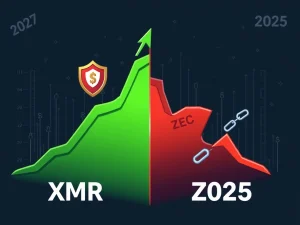Revolutionary Shift: Corporate Blockchains Face Crucial Decentralized Imperative, Warns StarkWare CEO

The cryptocurrency world is buzzing with a stark warning from a leading voice. Eli Ben-Sasson, co-founder and CEO of StarkWare, recently declared that corporate blockchains are ultimately doomed. This bold statement challenges the current trend of large entities exploring blockchain technology. It highlights a fundamental conflict: the desire for control versus the core ethos of decentralization that defines crypto. This perspective is crucial for anyone interested in the future of blockchain technology and its potential for widespread adoption.
The Decentralized Blockchain Imperative: A Core Principle
Eli Ben-Sasson argues passionately for the essential nature of decentralization. He believes that a true blockchain system must eliminate central control. This principle forms the bedrock of the entire crypto movement. Ben-Sasson emphasized this point in a recent post to X. He doubled down on his long-held opinion. He stated that ‘corpo’ chains will not last. They fundamentally misalign with blockchain’s core concept.
The very essence of blockchain technology lies in its distributed nature. It removes reliance on a single authority. Ben-Sasson explained the significant trade-offs involved. “The important element of blockchain is a system that gets rid of a central entity,” he said. “It comes at a cost: A very complex technology that’s hard to build and hard to use.” Even with advancements like Account Abstraction (AA) simplifying user experience, the underlying technology remains intricate. This complexity is the price of true decentralization. However, it delivers unparalleled security and censorship resistance.
Navigating Corporate Blockchains and Crypto Adoption
Many corporations now explore blockchain. This signifies a growing interest in blockchain technology. Ben-Sasson acknowledges this positive development. He views it as a sign that “blockchains are no longer this scary thing anymore.” This mainstream interest could pave the way for broader crypto adoption. Corporate involvement might reduce the perceived risk of blockchain for traditional businesses and consumers. For instance, new layer-1 solutions from companies like Stripe, such as Tempo, demonstrate this corporate push.
In the short term, these corporate-backed chains could indeed accelerate mainstream acceptance. They offer familiar interfaces and established brands. An X user asked Ben-Sasson about this possibility. He agreed that financial giants could aid initial adoption. However, he warns about the long-term outlook. Bitcoin, the original cryptocurrency, emerged to challenge central financial institutions. This history explains some community apprehension towards corporate ventures in the blockchain space. The crypto community often values self-custody and individual control above all else.
The Inevitable Decline of Controlled Chains, Says StarkWare CEO
Ultimately, Ben-Sasson predicts a grim future for purely corporate-controlled blockchains. He believes they will likely be abandoned within a few years. This abandonment will stem from two primary issues. First, the technical complexities will become too burdensome. Second, users will simply choose to avoid them. These chains lack the appeal of truly decentralized alternatives. They do not offer the benefits of DeFi, self-custody, or genuine control over assets. Ben-Sasson articulates this dilemma clearly.
“Fast forward a few years: Corporate chains will end up with the complex tech but without the added value for users, which is no central entity to control them,” he stated. At that point, corporations will lose focus on these chains. The absence of user appeal will diminish their strategic value. This perspective from the StarkWare CEO underscores a critical lesson. True blockchain success depends on aligning with user desires for freedom and autonomy. Without this alignment, even robust technology will fail to gain traction.
Diverse Perspectives on the Future of Corporate Blockchains
The crypto community holds varied opinions on the longevity of corporate blockchains. Not everyone shares Ben-Sasson’s absolute certainty. For example, an X user named Boluson suggested many corporations don’t genuinely need a blockchain. Instead, they feel pressure to adopt the technology. This pressure comes from a fear of being left behind. “Not every project in Crypto needs to have blockchain, now everyone wants to build something around creating a blockchain,” they commented. This view highlights a potential ‘blockchain for blockchain’s sake’ phenomenon.
Conversely, some believe corporate chains can succeed in specific niches. Rob Masiello, CEO of Sova Labs, offers a different viewpoint. His firm focuses on Bitcoin-native infrastructure. Masiello thinks corporate chains will be useful for their owners. However, he notes a key distinction. “Users just won’t have any way to participate in their upside. Base is an example,” he explained. This suggests a model where corporate chains serve internal business needs. They might not offer the same financial opportunities or governance participation as public, decentralized blockchain networks. This difference is critical for long-term user engagement.
Embracing the Ethos for Lasting Crypto Adoption
The path forward for corporations in the blockchain space remains a topic of intense debate. Some speculate that corporations might initially build chains. Then, they could hand over control to native crypto firms. Alternatively, they might acquire existing decentralized blockchains. This strategy would involve scaling them up for specific purposes. This approach could offer a middle ground. It allows corporations to leverage blockchain while respecting its core principles. It might foster genuine crypto adoption.
Ultimately, the message from the StarkWare CEO is clear. Any long-term success for enterprise blockchain hinges on a fundamental shift. Corporations must embrace the decentralized ethos. They cannot merely co-opt the technology while retaining central control. The future of blockchain technology, according to Ben-Sasson, lies in truly empowering users. It is about building systems that eliminate central entities. Only then can corporate ventures truly integrate into the transformative power of the crypto ecosystem. This crucial insight will shape the next era of digital innovation.









